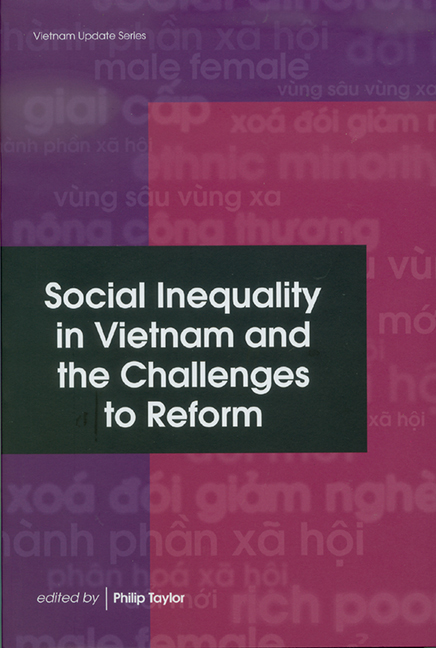Book contents
- Frontmatter
- Contents
- List of Tables
- List of Figures
- Preface
- Introduction: Social Inequality in a Socialist State
- 1 Vietnam's Recent Political Developments
- 2 Vietnam's Recent Economic Reforms and Developments: Achievements, Paradoxes, and Challenges
- 3 Behind the Numbers: Social Mobility, Regional Disparities, and New Trajectories of Development in Rural Vietnam
- 4 From Collectivization to Globalization: Social Differentiation in a Muong Ethnic Community of Vietnam
- 5 Political Capital, Human Capital, and Inter-generational Occupational Mobility in Northern Vietnam
- 6 Social Disparities in Vietnam: The Case of Poverty Reduction and Educational Attainment
- 7 Redressing Disadvantage or Re-arranging Inequality? Development Interventions and Local Responses in the Mekong Delta
- 8 The Politics of Land: Inequality in Land Access and Local Conflicts in the Red River Delta since Decollectivization
- 9 Female Garment Workers: The New Young Volunteers in Vietnam's Modernization
- 10 Class, Nation, and Text: The Representation of Peasants in Vietnamese Literature
- 11 Leisure and Social Mobility in Ho Chi Minh City
- Index
- About the Contributors
- Publications in the Vietnam Update Series
5 - Political Capital, Human Capital, and Inter-generational Occupational Mobility in Northern Vietnam
Published online by Cambridge University Press: 21 October 2015
- Frontmatter
- Contents
- List of Tables
- List of Figures
- Preface
- Introduction: Social Inequality in a Socialist State
- 1 Vietnam's Recent Political Developments
- 2 Vietnam's Recent Economic Reforms and Developments: Achievements, Paradoxes, and Challenges
- 3 Behind the Numbers: Social Mobility, Regional Disparities, and New Trajectories of Development in Rural Vietnam
- 4 From Collectivization to Globalization: Social Differentiation in a Muong Ethnic Community of Vietnam
- 5 Political Capital, Human Capital, and Inter-generational Occupational Mobility in Northern Vietnam
- 6 Social Disparities in Vietnam: The Case of Poverty Reduction and Educational Attainment
- 7 Redressing Disadvantage or Re-arranging Inequality? Development Interventions and Local Responses in the Mekong Delta
- 8 The Politics of Land: Inequality in Land Access and Local Conflicts in the Red River Delta since Decollectivization
- 9 Female Garment Workers: The New Young Volunteers in Vietnam's Modernization
- 10 Class, Nation, and Text: The Representation of Peasants in Vietnamese Literature
- 11 Leisure and Social Mobility in Ho Chi Minh City
- Index
- About the Contributors
- Publications in the Vietnam Update Series
Summary
This chapter examines the role of political capital and human capital in shaping inter-generational occupational mobility in northern Vietnam. Research in other (post-)socialist countries has generated a good number of theories on the relative role of political and human capital in social mobility, particularly in relation to market reforms. Market reforms are expected to gradually replace political capital with human capital as a main determinant of occupational attainment (Nee 1989; Szelényi 1988). Or market reforms will not alter the basis for occupational attainment, either because human capital continues to determine job attainment under both socialism and capitalism (Gerber 2000; Róna-Tas 1994), or because political capital is converted into economic advantage during market reforms (Róna-Tas 1994; Staniszkis 1991). The heated debate on the relative impact of political capital and human capital on social mobility in (post-)socialist countries has largely bypassed Vietnam (cf. Korinek 2002, chap. 8). I will seek to bring this broader debate to bear on inter-generational occupational mobility in Vietnamese society.
While Vietnam's experience of central planning and market reforms permits a comparative perspective, one should not lose sight of the specific local context in which these historical changes have unfolded. A defining feature of modern Vietnamese history is its prolonged war experience. While wars in Vietnam have been studied extensively, research on their impact on social inequality in Vietnam has yet to begin. I address this question by examining how military service in wartime affected political-capital attainment and occupational mobility. In so doing, this chapter will discern both similarity and difference between Vietnam and other (post-)socialist countries in terms of the underlying dynamics of occupational mobility.
Data for this study come from the 1995 panel of the Vietnam Longitudinal Survey (VLS) conducted in three northern provinces — Ha Nam, Nam Dinh, and Ninh Binh. As northern Vietnam was under a socialist centralized economy from the early 1950s until recent years, this dataset is particularly suitable for understanding the impact of political capital and human capital on occupational mobility. Moreover, information on party membership and military service, which is not available in most other survey data on Vietnam, makes the VLS dataset particularly useful.
- Type
- Chapter
- Information
- Social Inequality in Vietnam and the Challenges to Reform , pp. 166 - 207Publisher: ISEAS–Yusof Ishak InstitutePrint publication year: 2004

